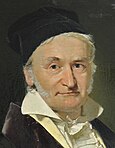Portal:Science/Featured biography/18: Difference between revisions
m Reverted edits by 74.137.192.216 (talk) to last version by Access Denied |
180.151.80.237 (talk) No edit summary |
||
| Line 4: | Line 4: | ||
|caption=Johann Carl Friedrich Gauss |
|caption=Johann Carl Friedrich Gauss |
||
|text='''[[Carl Friedrich Gauss]]''' {{Audio|De-carlfriedrichgauss.ogg|Pronunciation}} (30 April 1777 – 23 February 1855) was a [[Germany|German]] [[mathematician]] and [[scientist]] of profound [[genius]] who contributed significantly to many fields, including [[number theory]], [[mathematical analysis|analysis]], [[differential geometry]], [[geodesy]], [[magnetism]], [[astronomy]] and [[optics]]. Sometimes known as "the prince of mathematicians" and "greatest mathematician since antiquity", Gauss had a remarkable influence in many fields of mathematics and science and is ranked as one of history's most influential mathematicians. |
|text='''[[Carl Friedrich Gauss]]''' {{Audio|De-carlfriedrichgauss.ogg|Pronunciation}} (30 April 1777 – 23 February 1855) was a [[Germany|German]] [[mathematician]] and [[scientist]] of profound [[genius]] who contributed significantly to many fields, including [[number theory]], [[mathematical analysis|analysis]], [[differential geometry]], [[geodesy]], [[magnetism]], [[astronomy]] and [[optics]]. Sometimes known as "the prince of mathematicians" and "greatest mathematician since antiquity", Gauss had a remarkable influence in many fields of mathematics and science and is ranked as one of history's most influential mathematicians. |
||
Gauss completed ''[[Disquisitiones Arithmeticae]]'', his [[magnum opus]], at the age of twenty-one (1798), though it would not be published until 1801. This work was fundamental in consolidating number theory as a discipline and has shaped the field to the present day. |
Gauss completed ''[[Disquisitiones Arithmeticae]]'', his [[magnum opus]], at the age of twenty-one (1798), though it would not be published until 1801. This work was fundamental in consolidating number theory as a discipline and has shaped the field to the present day.lalalalalalalalalasasjdjagsda jsdajsdgjas dgjasdg ajd gjasdgaj dgjadgja gajsgjah djasgdj agdjash dgjasghdja sdg |
||
|link=Carl Friedrich Gauss |
|link=Carl Friedrich Gauss |
||
}} |
}} |
||
Revision as of 13:59, 15 March 2017
Carl Friedrich Gauss ⓘ (30 April 1777 – 23 February 1855) was a German mathematician and scientist of profound genius who contributed significantly to many fields, including number theory, analysis, differential geometry, geodesy, magnetism, astronomy and optics. Sometimes known as "the prince of mathematicians" and "greatest mathematician since antiquity", Gauss had a remarkable influence in many fields of mathematics and science and is ranked as one of history's most influential mathematicians.
Gauss completed Disquisitiones Arithmeticae, his magnum opus, at the age of twenty-one (1798), though it would not be published until 1801. This work was fundamental in consolidating number theory as a discipline and has shaped the field to the present day.lalalalalalalalalasasjdjagsda jsdajsdgjas dgjasdg ajd gjasdgaj dgjadgja gajsgjah djasgdj agdjash dgjasghdja sdg

